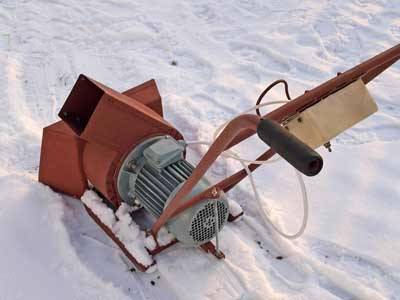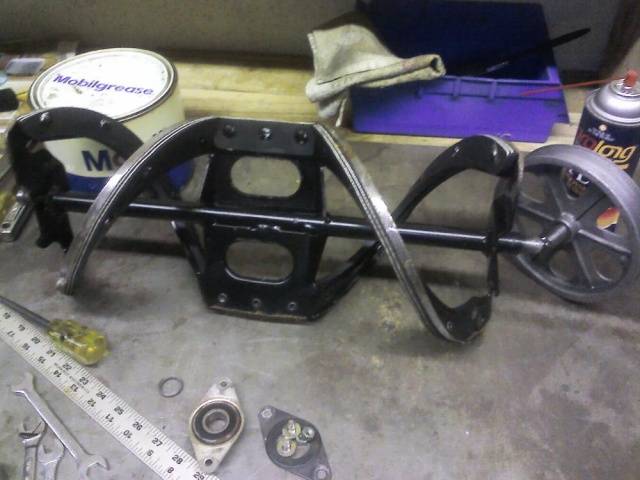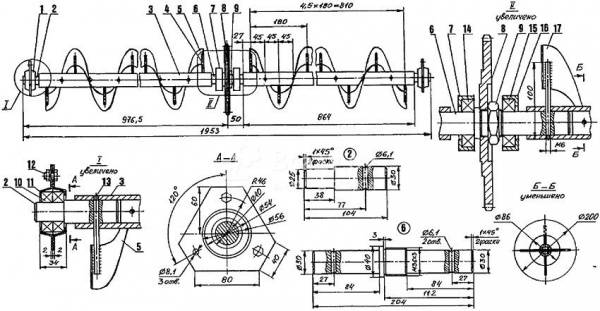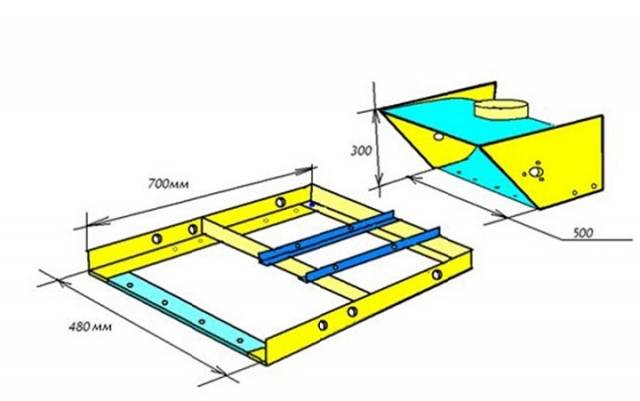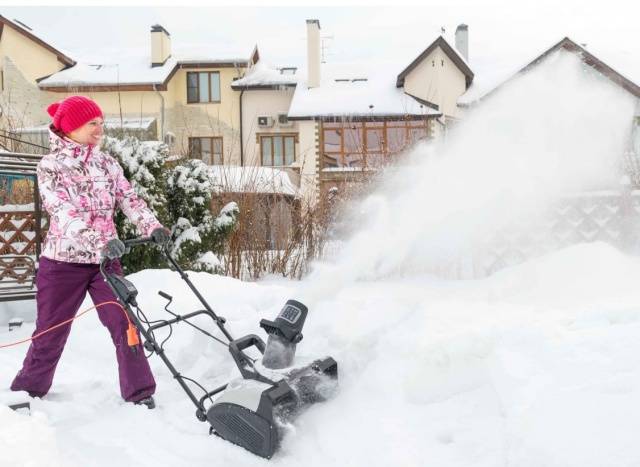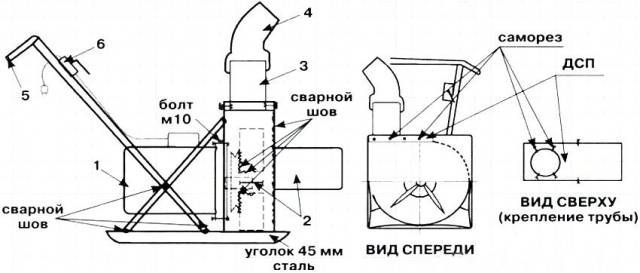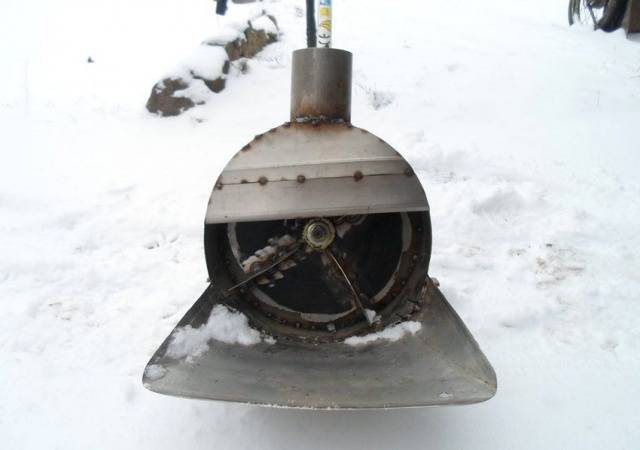Content
Assembling a homemade electric snow blower at home is not so difficult. One must be able to use a welding machine and have access to a lathe. As a last resort, you can grind parts to order by visiting a metalworking workshop. An electric motor for a snow blower is suitable for any asynchronous, designed for 220 volts with a power of approximately 2 kW.
Nuances of designing a homemade electric snow blower
When assembling an electric snow blower with your own hands, many questions will surely arise regarding the technical side of the machine. Any craftsman tries to find out what spare parts are best for his invention. Most of the questions arise regarding the electrical part of snow removal equipment:
- The snow blower does not have to be equipped with a separate electric motor, the body of which is flanged or with mounting feet. Homemade equipment can be equipped with any motor that comes with a powerful power tool. A grinder, trimmer, electric drill or hammer drill will do.
- If needed make a snow blower to a dacha, where it is supposed to occasionally clear a small area from freshly fallen snow, then the engine power will be enough from 1.6 to 2 kW. Such a machine will throw the snow mass at a distance of up to 4 m.
- When using a motor with high rpm, you need to come up with a reduction gear. It can be made from a set of pulleys or sprockets of different diameters. For example, a 1.6 kW grinder motor develops up to 6 thousand rpm. They need to be lowered to 3, and preferably 2 thousand rpm. For a homemade snow blower, an electric motor with a power of 2.2 kW is optimal, with a shaft speed of 2–2.5 thousand rpm. Often the calculation of the motor power is determined by the formula: 1 kW per 150 mm of the working mechanism, for example, an auger.
- Compared to a gasoline engine, an electric motor is a greater hazard to the operator. This is due to electric shock. Snow must not get into the motor, therefore it must be lifted on the snow blower frame higher from the ground. Additionally, you must try to make a sealed casing.
- The electric snow blower will be connected to an outlet through a long carrier. It is desirable to find the cable armored with reliable insulation that can withstand low temperatures down to -60aboutFROM.
Compliance with safety rules is necessary for the operator himself, so the electrical part of the snow blower must be taken seriously. When all these nuances have been carefully thought out, you can start creating the machine itself.
Making auger for an electric snow blower
Almost every snow blower is equipped with an auger mechanism. It doesn't matter if it's electric or petrol. The auger is a rotating drum with knives twisted in a spiral. Moreover, they are completed in two parts. The spiral turns are directed towards the center where the steel blades are. As the auger rotates, the blades rake the snow from the sides of the snow blower body and direct it towards the center. The blades pick up the loose mass and push it out through the nozzle, on which there is a sleeve with a guiding visor.
To make a snow blower auger, you need to find a shaft. For this, a pipe with a thickness of 20 mm is suitable. The width of the snowplow depends on its length, but it is unnecessary to be zealous. Usually 500-800 mm is enough. In the center of the pipe, two rectangular plates of thick steel are welded, located opposite each other.These will be the shoulder blades.
The auger knives are cut from sheet metal or the side shelves of car tires. A conveyor belt is also suitable. For a 500 mm wide drum, you will need 4 discs with a diameter of 280 mm. A hole is drilled in the center of each workpiece. Its diameter should correspond to the thickness of the shaft. The resulting rings are sawn from the side, after which the edges are stretched in opposite directions.
The finished turns of the spiral are fixed to the shaft towards the blades, as shown in the drawings. One edge of the knife is fixed on the blade itself, and the other is fixed to the rack, which is also welded to the shaft.
The trunnions are welded to the ends of the shaft, and bearings No. 305 are placed on them. They must be of a closed type, otherwise jamming will occur from the ingress of snow with sand.
The bucket for a snow blower is bent by hand from sheet steel with a thickness of 2 mm. Its width is equal to the length of the auger, plus they leave free space for the drive. The inner semicircle of the body is made 20 mm larger than the diameter of the spiral knives. In our example, the size of the bucket semicircle is 300 mm. The side walls are cut from steel or thick plywood. The hubs are fixed in the center, and the auger with bearings is installed. Before this, one of the trunnions must be fitted with a belt pulley or a chain sprocket.
During operation, all auger snow blowers throw snow far to the side. To do this, a hole is cut out at the top of the bucket opposite the blades - a nozzle. Here, a sleeve from a piece of pipe and a pivoting visor are fixed.
Assembling the auger snow blower with electric motor
So, the auger working part of the snow blower itself is ready, now you need to equip it with an electric motor. First, you need to weld the snowblower frame. This will require metal corners. In the process, you can use the drawing. A frame size of 480x700 mm for a 500 mm wide auger nozzle will be sufficient. It is important to provide two jumpers to secure the motor.
From the bottom to the frame, the ski runners are fixed. They can be cut from wood or bend the edges of metal corners. It is better to make the control handle adjustable. An electric motor and a screw nozzle are bolted to the jumper. Now it remains to make the drive on the snow blower. It can be chain with sprockets or belt with pulleys.
It is better to connect a short cable to the electric motor. At the free end, a connector is provided for connecting to a carrier. Before starting the motor, the auger must be rotated by hand. It should rotate freely without knives hitting the bucket body. If everything is in order, you can try the snow blower at work.
Electric snow blower from trimmer
A good do-it-yourself snow blower can be assembled from a trimmer. However, not every electric scythe is suitable for homemade products. Curved bar models transmit torque from the motor to the knife through a flexible cable. Such trimmers usually equipped with low-power electric motors. They are not suitable for a snow blower. A good car will turn out from an electric braid with a flat bar, where the torque is transmitted through a gearbox by a rigid shaft.
Having prepared the welding machine, metal blanks and the trimmer itself, they begin to create a snow blower:
- First you need to assemble the case itself. It is made in a round shape. You can bend a steel sheet, but it is better to find a metal barrel. It must be cut off with a grinder, stepping back 150 mm from the bottom. The impeller will rotate inside this housing. To install the mechanism in the center of the bottom of the barrel, a hole is drilled along the thickness of the gearbox shaft. A square window is cut from the side, through which snow will be ejected. The trimmer gear itself will also be fixed to the bottom of the barrel, so additional holes are drilled for it.
- The barrel is turned so that the snow throwing window is at the top. In front, the open part of the body is 1/3 welded with a steel sheet.
- The rotor of the snow blower is a five-blade impeller, but usually four or three of them are enough. To make a structure, you need a disc. Steel plates with a size of 250x100 mm, cut in the form of blades, are welded onto it.
- Now you need to weld a spatula to the bottom of the body in front. It will cut the snow layer as the snow blower moves forward. A piece of steel sheet with dimensions of 400x300 mm is suitable for the blade. On the sides, you can bend the guiding sides 20 mm high.
- A square pipe with a height of about 100 mm is welded to a window cut out on the side of the case. A visor is put on it, which will direct the thrown snow to the side.
After the trimmer gear is bolted to the bottom of the barrel, the rotor is connected to the electric scythe instead of the knife. The entire structure is installed on the frame. For movement, a wheel pair or skis are provided. The finished snow blower is first checked by turning the impeller by hand. If the blades do not cling anywhere, you can try the design at work.
The video shows an example of converting a trimmer into a snow blower:
An electric snow blower assembled according to any scheme will cope with loose, freshly fallen snow. The equipment will work quietly without disturbing the neighbors. An electric snow blower will do without refueling and oil. However, this design has a significant drawback. The low power of the electric motor does not allow you to create a self-propelled machine. The snow blower will constantly have to be pushed with hands and it is better to do this in the snow if the frame is put on wooden skis.
